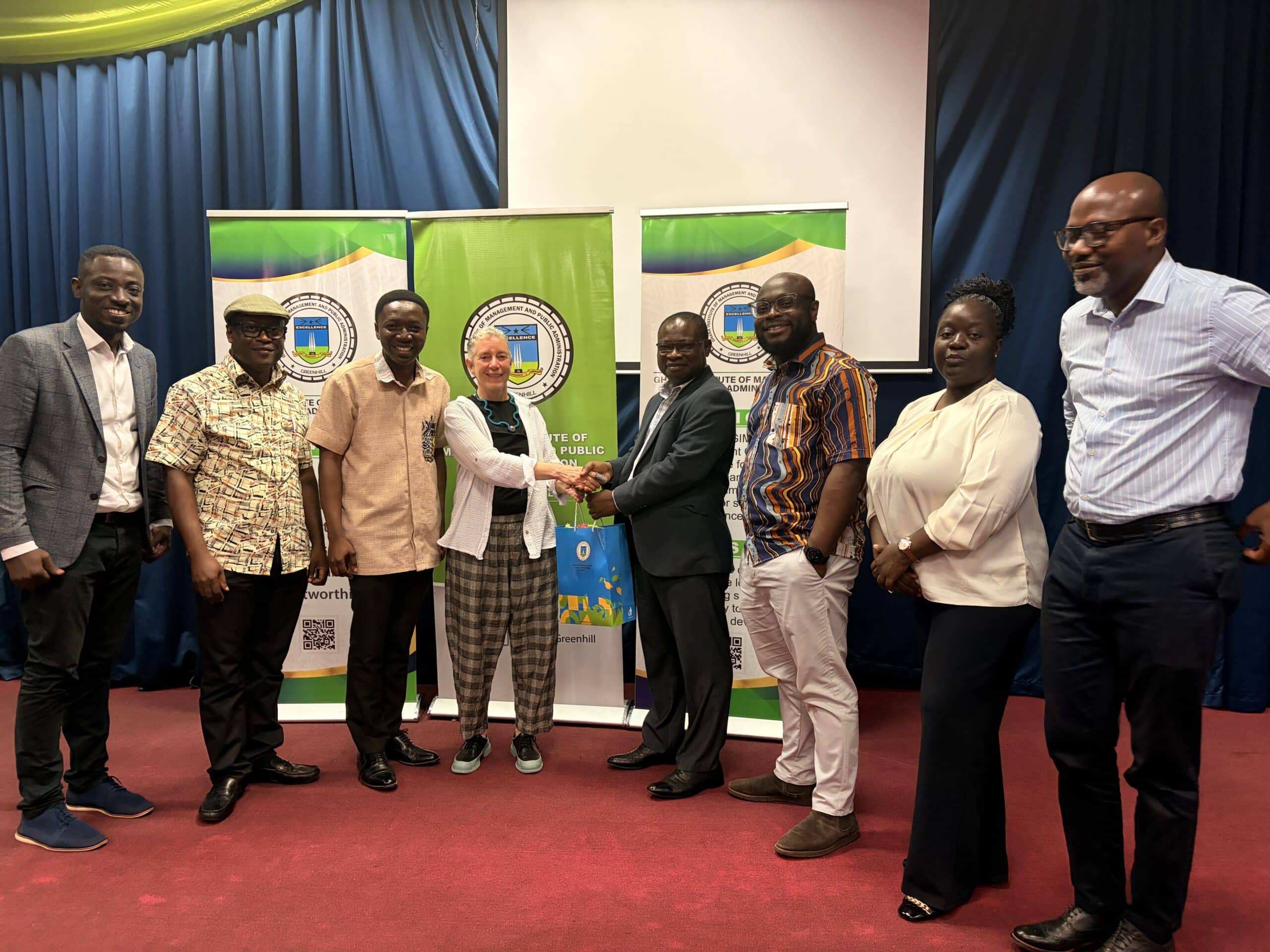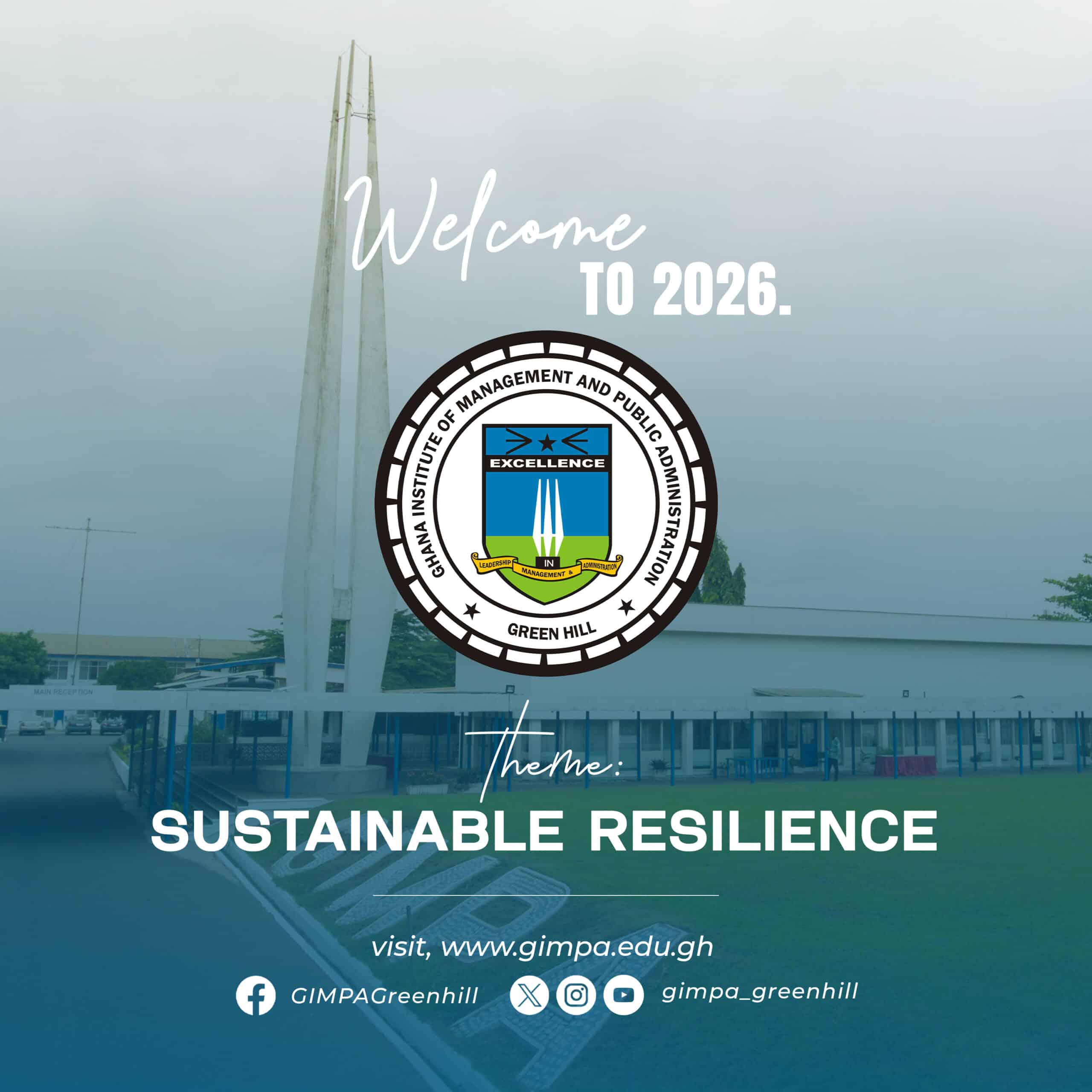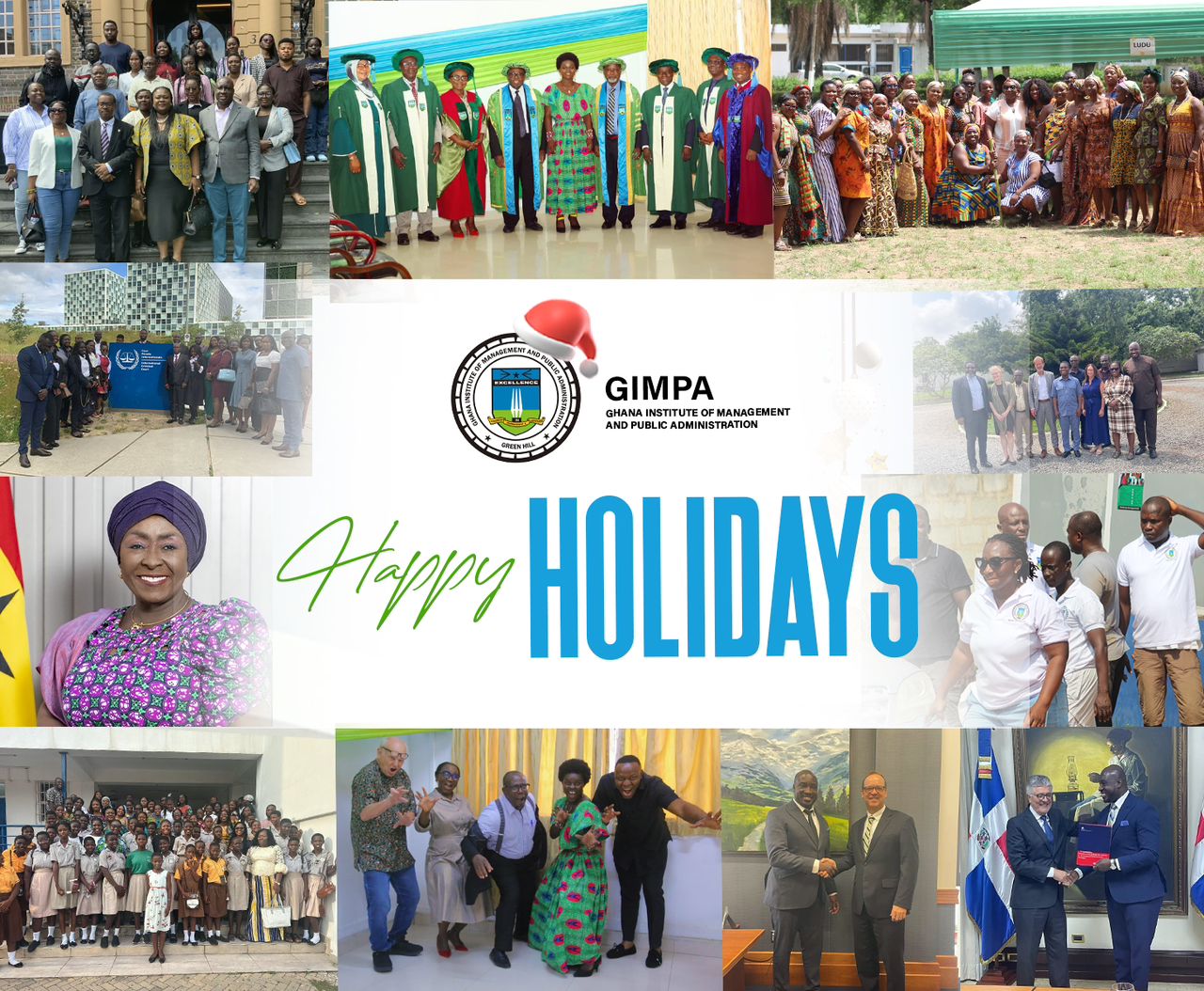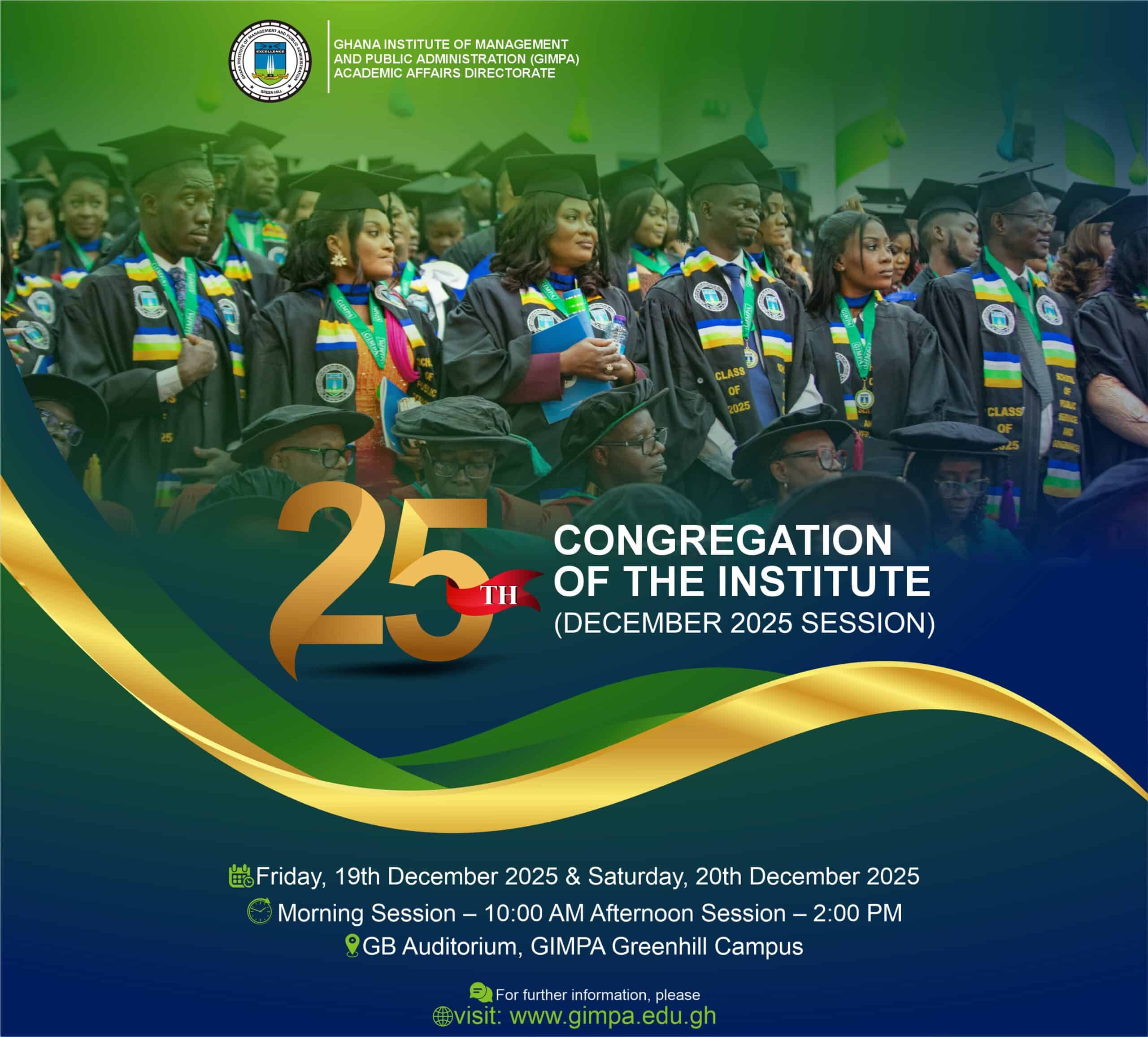School Of Research and Graduate Studies
The School of Research and Graduate Studies (SRGS) was established in February 2018 as the cornerstone to achieving GIMPA’s Vision of becoming a research-intensive and graduate study-focused university and mirroring aspirations stipulated in GIMPA’s Strategic Plan. SRGS’s mission is to promote a conducive environment for research by Faculty and Students to impact national policy and development, teaching and learning at the graduate level, and general acquisition of knowledge.

Dean’s Message

Prof. Wisdom Akpalu
Dean, School of Research and Graduate Studies
Welcome to the School of Research and Graduate Studies (SRGS) at GIMPA, the Institute’s newest school. Established in 2018, SRGS is dedicated to research and graduate studies. We aim to become a leading national research institute, acknowledged locally and internationally for our valuable contributions to national development. We are committed to fostering an environment that encourages faculty and students to engage in impactful research, advance teaching and learning at the graduate level, and promote the acquisition of knowledge in general. As the coordinating body for all graduate programs, including master’s and doctoral programs, within the Institute, SRGS ensures the maintenance of high-quality standards. We facilitate interdisciplinary and transdisciplinary research, support research capacity building, and assist with grant application and management. We aim to create a supportive atmosphere where graduate students can think critically, enhance their theoretical skills, and apply their knowledge to address real-world issues.
Collaboration is essential to our mission, and we have established partnerships with esteemed national and international institutions. These include ISSER at the University of Ghana, the Environment for Development Initiative (EfD) at Gothenburg University in Sweden, and the World Resource Institute (WRI) in the United States. Through these collaborations, we promote high-quality academic research, develop new programs, enhance research capacity among faculty and students, and provide training for decision-makers. To ensure accessibility to faculty research and knowledge products, SRGS has implemented the GIMPA Working Paper Series (GWPS) and the GIMPA Research Intensification Seminar Series (GRISS). These platforms offer convenient access to the valuable work of our faculty. Additionally, SRGS has played a pivotal role in establishing the Institute-wide Institutional Review Board (IRB), which oversees and approves all faculty research projects involving human subjects. On behalf of the SRGS faculty, I warmly welcome you to GIMPA. We are delighted to have you join us on this journey of research and academic excellence.
About Us
The School of Research and Graduate Studies (SRGS) was established in February 2018 as the cornerstone to achieving GIMPA’s Vision of becoming a research-intensive and graduate study-focused university and mirroring aspirations stipulated in GIMPA’s Strategic Plan. SRGS’s mission is to promote a conducive environment for research by faculty and students to impact national policy and development, teaching and learning at the graduate level, and general acquisition of knowledge.
The school is mandated to:
- facilitate research activities by the faculty and students by providing a scholarly and conducive environment for interdisciplinary teamwork.
- ensure the maintenance and coordination of high standards and quality graduate programs offered by the various Schools and Faculties at GIMPA
- to create a structure for the schools to fulfil their mandate.
- harmonize graduate programs offered by the various Schools.
Activities of the School of Research and Graduate Studies (SRGS)
As a coordinating school that aims at promoting high-quality graduate training and high-quality policy-relevant research, the SRG undertakes several activities, including the following:
- Recruiting graduate students, processing graduate student applications, facilitating the graduate student’s thesis examination and oral defence, and ensuring the students’ Theses meet specific requirements.
- Assist in reviewing graduate courses and programs to ensure relevance and quality.
- Oversee the activities of the Institutional Review Board (IRB), which the school helped to establish, to ensure that all social science research involving human subjects meets strict ethical standards.
- Forging research collaborations with world-ranking institutions nationally and internationally and promoting research among the faculty through capacity-building initiatives
- Operate a research office to assist the faculty in writing grant proposals for academic research.
- Facilitate Institute-wide research seminars dubbed GIMPA Research Intensification Seminar Series (GRISS) and the GIMPA Working Paper Series publication.
The SRGS coordinates all graduate programs of the four schools that currently run them. The graduate programs include:
- Postgraduate Diploma
- Master’s Programs
- Doctoral Degree programs
The schools and Academic Programmes
Business School
Department of Computer Sciences
Doctor of Management
Doctor of Philosophy in Business Administration Marketing
Executive Master of Business Administration
Master of Business Administration, Accounting and Taxation Option
Master of Research in Business Administration, Accounting Option
Post Graduate Diploma in Business Administration
School of Public Service and Governance
Doctor of Philosophy in Public Administration, Governance, and leadership
Master of Philosophy in Public Health
Master of Science in Health Services Administration & Leadership
Master of Arts in Governance & Leadership
Master of Public Administration
Master’s in International Relations and Diplomacy
Postgraduate Diploma in Monitoring and Evaluation
Postgraduate Diploma in Public Administration
School of Technology
Master of Science in Digital Forensics and Cybersecurity
The principal aim of this MSc Digital Forensics and Cyber Security programme is to impart knowledge on analysis, assessment and minimisation of cyber security risk and, effective ways to extract and use digital information from a wide range of computerised systems and devices. The programme also explores the central legal issues in generation, analysis and use of digital evidence and their implications on security, information privacy and data protection. Programme Highlights: Cybercrime and Risk Management, Digital Forensics, Information Technology Audit, Database and Programming, Legal Aspects of Information Technology, and Cryptography and Security Mechanisms. Duration: One (1) Year Offering mode: Weekends Programme Coordinator: Dr. Joseph Budu E-mail: josbudu@gimpa.edu.gh
Admission requirementsApplicants must have a minimum of Second Class Lower Bachelor’s degree in computing, information systems, or electronic engineering, or any other related discipline from an accredited University. Applicants with degrees from non-computing related fields must first take and pass the post-graduate diploma in Information Technology offered at the School of Technology, GIMPA. A complete application pack must include: • A completed GIMPA application form; • Official transcripts of the applicant’s previous academic record at the university level; • Full curriculum vitae • A statement of purpose; • Three letters of recommendation commenting on the applicant’s ability to pursue the programme
Master of Science in Management Information Systems
The programme will touch on the main tenets of MIS – analysis, development, implementation and management – and their applications in business/public administration. MIS will be discussed in terms of its strategic value and challenges as they are adopted and deployed by both public and private sector organisations. Modules in the programme will delve into the particular dimensions of the tenets with the aim of evaluating alternative methodologies, and philosophies in each of them. It will also aim at discussing these methodologies and the suitability of their applications in the contexts of public and private sector organisations.
Duration: Two(2) Year Offering mode: Evening and Weekends Programme Coordinator: Dr. Joseph Budu E-mail: josbudu@gimpa.edu.gh Admission requirements One or both of the following:1. Applicants who hold undergraduate degrees a) They must have a Bachelor’s degree from an accredited university. b) Those with a minimum of second class upper degree may be admitted directly after their Bachelor’s degree. c) Those with a grade below second class upper degree should have a minimum of two years work experience. d) They may come from a variety of backgrounds but must have basic knowledge and skills in information technology. e) A formal interview may be used to determine all applicants’ ability to take and pass the most technical courses of the programme.
2. Graduates of GIMPA Post-Graduate Diploma in Management Information Systems who meet requirements a) and b) below will be admitted into the programme and exempted from taking the following courses: • Organisational Study of Information Systems • Information Risk and Security a) They must pass each of the following courses in the Diploma programme with a grade point average of 3.50 or better: • Foundations of MIS • Information Systems Security They must obtain a cumulative grade point average of 3.50 or betterMaster of Philosophy in Management Information Systems (MPhil)
The programme will touch on the main tenets of MIS – analysis, development, implementation and management – and their applications in business/public administration. MIS will be discussed in terms of its strategic value and challenges as they are adopted and deployed by both public and private sector organisations. Modules in the programme will delve into the particular dimensions of the tenets with the aim of evaluating alternative methodologies, and philosophies in each of them. It will also aim at discussing these methodologies and the suitability of their applications in the contexts of public and private sector organisations. The following modules will define the programme: Duration: Two (2) Years
Offering mode: regular (day) Programme Coordinator: Prof. Gamel Wiredu E-mail: gwiredu@gimpa.edu.gh Admission requirements: 1. Applicants who hold undergraduate degrees a) They must have a Bachelor’s degree from an accredited university. b) Those with a minimum of second class upper degree may be admitted directly after their Bachelor’s degree. c) Those with a grade below second class upper degree should have a minimum of two years work experience. d) They may come from a variety of backgrounds but must have a basic knowledge and skills in information technology. e) A formal interview may be used to determine all applicants’ ability to take and pass the most technical courses of the programme. 2. Graduates of GIMPA MSc in Management Information Systems: a) must obtain a FGPA of 3.0 or more b) will be exempted from all Year One courses 3. Graduates of GIMPA Post-Graduate Diploma in Management Information Systems who meet requirements a) and b) below will be admitted into the programme and exempted from taking the following courses: ● Organisational Study of Information Systems ● Information Risk and Security a) They must pass each of the following courses in the Diploma programme with a grade point average of 3.50 or better: ● Foundations of MIS ● Information Systems Security b) They must obtain a cumulative grade point average of 3.50 or better.Master of Science in Information and Communication Technology
Today, it is difficult to think of an individual, group, organization or nation that is not being affected by Information and Communication Technology (ICT). ICT is no longer a sidestream issue but a mainstream one that must be confronted and understood for socio-economic development, for business strategising, for personal organisation, and for enhanced group collaboration. The programme equips students with scientific knowledge for analytical thinking in ICT development and management.
Programme highlights: Information and Network Security, Decision Support Systems, Software Engineering, Wireless Network Architecture and Design, Data Communications and Networks, Artificial Intelligence Applications, among others. Duration: two (2) years Offering mode: weekends and Evening Programme coordinator: N/A Admission requirements- Applicants must have a minimum of 2nd Class Lower Bachelor’s degree in ICT, Computer Science or ICT-related discipline from an accredited university.
- A formal interview shall be conducted for applicants with other backgrounds to determine the ability of all applicants to take and pass the most technical courses of the programme.
Master of Science in Information Technology and Law
This MSc Information Technology and Law (IT & Law) programme is intended to equip students with critical understanding of the legal and administrative implications on adoption, implementation and use of ICT innovation, and information privacy, security and aspects of law that are most relevant to the work of IT-professionals.
Programme highlights: Legal Environment & Commercial Law, Digital Media and Intellectual Property Law, Computer Forensics and Cybercrime Investigation, Internet Governance and ICT Regulation, Electronic Transactions Law, Information Privacy and Data Protection, among others.
Duration: two (2) years
Offering mode: weekends and Evening
Admission requirements
- Applicants must have a minimum of 2nd Class Lower Bachelor’s degree in ICT, Computer Science or ICT-related discipline from an accredited university.
- A formal interview shall be conducted for applicants with other backgrounds to determine the ability of all applicants to take and pass the most technical courses of the programme.
Master of Science in Applied Mathematics (Industrial Analytics)
Recent developments in technology have affected most fields ranging from biology to finance. They generate enormous amounts of data that can be mined to understand natural phenomena and also to predict future behaviours of systems. Collaborations with experts in the analytical fields serve this purpose. The programme, Applied Mathematics, provides the interface where analytics is integrated into the specialized domain knowledge to solve practical problems in the various fields.
Programme highlights: Management Science Stochastic Processes, Statistical Modelling, Database and Programming, Mathematics for Industry, Computer Solutions and Modelling, Differential Equations and Applications, Numerical Analysis, among others Duration: one (1) year Offering mode: weekends and Evening Admission requirements- Applicants must have a minimum of Second Class Lower Bachelor’s degree in Mathematics, Statistics, Actuarial Science, Engineering, Computer Science, Physics or any other mathematically-related discipline from an accredited University.
- A formal interview shall be conducted for applicants with other backgrounds to determine the ability of all applicants to take and pass the most technical courses of the programme.
PG.Dip.(ICT) Information and Communication Technology
PG. Dip.(MIS) Management Information System
School of Liberal Arts and Social Sciences
Master of Philosophy in Economics
Master of Science in Energy Economics
Master of Science in Economic Policy
MA in Development Communication
MA in Public Relations
Admission requirements (Postgraduate Diploma, Graduate and Ph.D.)
- Postgraduate Diploma programs: at least third class
- Master’s Programs: at least second-class lower division
- Doctor of Management: Master’s degree with at least a 3.0 CGPA
- Doctor of Philosophy (PhD): Master’s degree with at least 3.0 CGPA
Research
The school aims to promote research at GIMPA and set the Institute apart as a research-intensive academic institution in Ghana. In 2019, the SRGS launched the GIMPA Research Intensification Seminar Series (GRISS) for the faculty and guests to present their research work to the wider community for feedback.
Faculty Seminar
- The SRGS organizes seminars where several papers are presented as part of GRISS
- The school, with support from the EfD-Ghana, has been organizing training workshops on different themes including grant proposal writing, and data management for faculty and graduate students.
- With support from the EfD-Ghana, SRGS has organized several high-level stakeholder engagement workshops on topics such as sustainable fisheries management, sustainable energy transition, forest resource management, and waste management.
Partnerships
The EfD-Ghana The SRGS is currently collaborating with the Institute of Statistical Social and Economic Research (ISSER) at the University of Ghana to run the Environment for Development Initiative in Ghana (EfD-Ghana) center. The EfD-Ghana is one of the thirteen (13) global research centers of excellence aimed at promoting high-quality and policy-relevant research, capacity building, and policy advocacy in developing countries. The EfD centers are funded by the Swedish International Development Cooperation (SIDA).
NEWS STAND


New Year Message from Prof. Samuel K. Bonsu, Rector of GIMPA

Christmas Message from Prof Samuel K. Bonsu, Rector of GIMPA

Get the latest new right in your inbox.
Contact Us
Get In Touch
Looking forward to shaping your future? Reach out to us! We’re here to assist in your academic journey and beyond. Let’s connect and start your pathway to success today!
Open Hours
Mon – Fri : 8:30 – 18:00GMT
Phone number
+233-(0) 501620138+233-(0) 332095432+233-(0) 302908076+233-302-401681-3 ext 1302
Our Location
SRGS is located on the ground floor of infilling Lot 2 (opposite the Law Faculty) on GIMPA MAIN CAMPUS. GPRS:GA-341-2901
Our Email
srgs@gimpa.edu.gh


